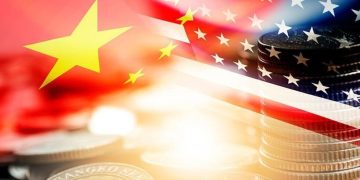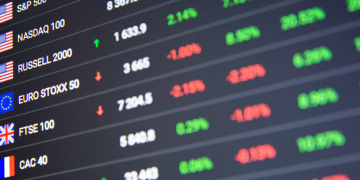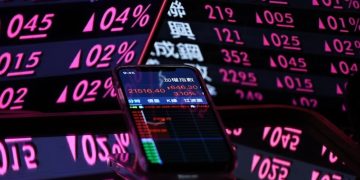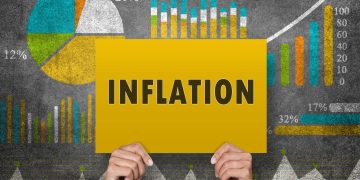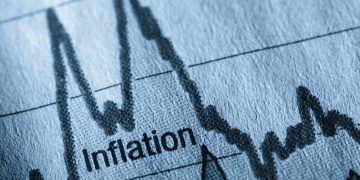Introduction
In recent years, global inflation has surged to levels not seen in decades, driven by a confluence of factors such as supply chain disruptions, energy price spikes, and the lingering economic effects of the COVID-19 pandemic. The war in Ukraine and subsequent energy crises have further exacerbated inflationary pressures worldwide, leaving economies grappling with both rising prices and slowing growth. As inflation outpaces many countries’ economic growth, it has placed tremendous pressure on central banks to implement monetary policies that can mitigate inflation without derailing economic recovery.
At the heart of this challenge is whether central banks, with their monetary tools—primarily interest rate hikes, quantitative tightening (QT), and asset purchases—can effectively stabilize the global financial system. As the Federal Reserve (Fed), the European Central Bank (ECB), and other major central banks raise rates to fight inflation, there are growing concerns about whether these actions will achieve the desired outcome or inadvertently push economies into recession.
This article explores the role of central banks in combating high global inflation and evaluates whether their monetary policies will be effective in stabilizing financial markets and fostering sustainable economic growth.
I. The Global Inflation Surge: A Multifaceted Crisis
The global inflationary surge that began in 2021 has been triggered by several interrelated factors, creating a perfect storm of inflationary pressures.
- Supply Chain Disruptions: The COVID-19 pandemic severely disrupted global supply chains, creating shortages of goods and services. As economies reopened, pent-up demand collided with constrained supply, pushing prices higher. Industries from semiconductors to consumer goods have experienced persistent supply bottlenecks, leading to inflationary price increases.
- Energy Price Shocks: The war in Ukraine and related sanctions on Russia have caused significant disruptions in global energy markets. Russia, a key supplier of oil and natural gas, has seen its exports restricted or redirected, leading to energy price spikes. Rising fuel prices have not only increased household expenses but have also contributed to higher production and transportation costs across the global economy, further inflating the cost of goods.
- Labor Market Imbalances: In some countries, particularly in the U.S. and Europe, labor shortages have led to wage inflation. With fewer workers available to fill jobs, companies are offering higher wages, which, in turn, are passed on to consumers in the form of higher prices. This wage-price spiral is a classic driver of core inflation.
- Increased Demand Post-COVID: As vaccines rolled out and economies emerged from lockdowns, consumer demand surged, particularly for durable goods and services. While demand in many sectors rebounded faster than supply could adjust, inflationary pressures mounted. The stimulus packages in various countries also played a role in boosting demand, though they came at a significant fiscal cost.
- Currency Depreciation: In some countries, inflation is being exacerbated by currency depreciation. As central banks raise interest rates to control inflation, capital flight from emerging markets, combined with rising global interest rates, has weakened some national currencies. A weaker currency increases the cost of imports, contributing to further inflationary pressures.
II. Central Banks’ Monetary Policy Responses
In response to surging inflation, central banks worldwide have adopted aggressive monetary policies, including interest rate hikes and quantitative tightening (QT). These measures aim to reduce inflation by making borrowing more expensive and slowing down economic activity. However, the effectiveness of these measures in stabilizing global financial markets remains uncertain.
1. Interest Rate Hikes
The most direct tool at the disposal of central banks is the adjustment of interest rates. By raising rates, central banks can reduce consumer demand and business investment, thereby cooling inflation.
- U.S. Federal Reserve (Fed): The Fed has embarked on a series of interest rate hikes, marking a shift away from the ultra-loose monetary policies of the pandemic era. By raising the federal funds rate, the Fed aims to reduce consumer demand and investment, thereby alleviating price pressures. However, there are concerns that aggressive rate hikes could stifle economic growth, potentially pushing the economy into recession.
- European Central Bank (ECB): Similarly, the ECB has been under increasing pressure to raise rates. The Eurozone has been facing persistent inflation driven by energy prices and supply chain issues. The ECB has signaled its intention to tighten monetary policy, but the challenge remains managing inflation while avoiding a deep economic downturn, particularly in countries that are more reliant on Russian energy.
- Bank of England (BoE): In the UK, inflation has been running at decades-high levels, driven by rising energy prices and labor shortages. The BoE has been hiking rates to curb inflation, though its ability to manage the situation is complicated by Brexit-related disruptions and a weaker currency.
Challenges of raising interest rates:
- Increased borrowing costs: Higher rates make loans and mortgages more expensive, which could lead to reduced consumer spending and business investment. In economies where debt levels are already high, such as in the U.S. and Europe, the effects could be more pronounced.
- Global economic slowdown: Central banks’ interest rate hikes could lead to a global economic slowdown, particularly in emerging markets, where higher rates in developed economies could lead to capital outflows and weaker currencies.
- Market volatility: Financial markets, particularly equity markets, may experience volatility as higher interest rates reduce the appeal of stocks relative to safer assets like bonds.
2. Quantitative Tightening (QT)
In addition to raising interest rates, central banks have used quantitative easing (QE) in recent years, a policy of purchasing government bonds to inject liquidity into the economy. As inflation rises, however, central banks are reversing this approach with quantitative tightening (QT), reducing their balance sheets and pulling money out of the financial system.
- Fed’s QT: The Fed’s transition from QE to QT has been one of the most significant policy shifts. By selling off or letting expire the Treasury and mortgage-backed securities it accumulated during the pandemic, the Fed is aiming to reduce inflationary pressures by tightening liquidity in the financial system. However, the Fed faces a delicate balancing act—if it tightens too aggressively, it could risk destabilizing the financial markets or pushing the economy into a recession.
- ECB and BoE’s QT: The ECB and BoE have similarly indicated a shift toward QT. However, unlike the U.S., both institutions are dealing with greater challenges related to debt in the Eurozone and the UK, where certain member countries have more fragile economies. The risk of QT in these regions is that it could lead to financial instability if the bond market reacts too harshly.
Challenges of quantitative tightening:
- Liquidity crunch: QT reduces the amount of liquidity in the system, which can lead to higher borrowing costs for governments, businesses, and consumers. It may also dampen economic activity, particularly in sectors reliant on credit.
- Asset market volatility: With less central bank support for bond markets, asset prices, particularly sovereign bonds and corporate bonds, could experience heightened volatility. This could affect pension funds, insurance companies, and other financial institutions with large bond portfolios.
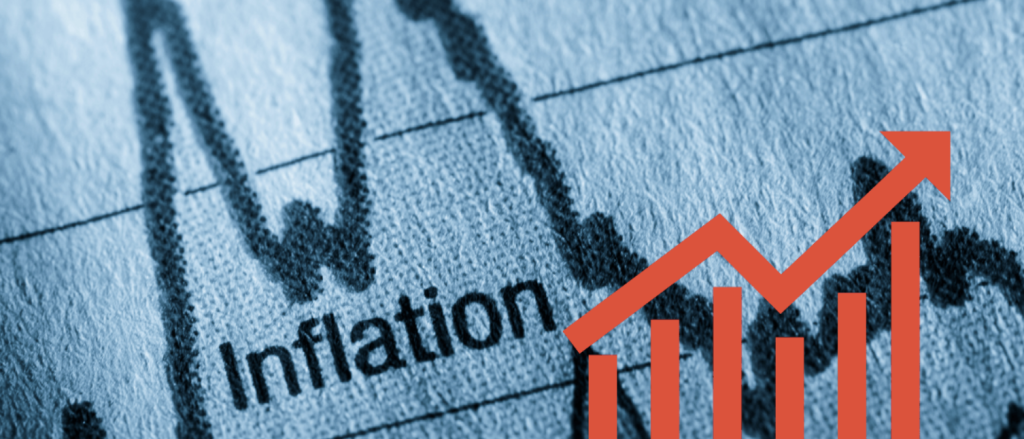
III. Can Central Banks Effectively Stabilize Financial Markets?
While central banks have powerful tools at their disposal, the challenge they face in stabilizing global financial markets and controlling inflation is enormous. The effectiveness of their monetary policies depends on several factors:
- Inflation Expectations: Central banks must manage inflation expectations effectively. If consumers and businesses expect prices to continue rising, they will act in ways that reinforce inflation (e.g., demanding higher wages, raising prices, etc.). Credible central bank actions that restore faith in their ability to control inflation can help anchor these expectations.
- Global Coordination: Since inflation is a global phenomenon, international coordination is crucial. Central banks must work together to avoid policy mistakes that could destabilize global markets. Coordinated rate hikes and policy interventions can help prevent capital flight and reduce volatility across financial markets.
- Risk of Recession: One of the primary risks associated with tightening monetary policy is the potential to push economies into recession. In highly indebted countries, higher interest rates could lead to debt defaults, financial market disruptions, and lower consumer spending. The challenge is to find the right balance between inflation control and economic growth.
- Emerging Markets and Capital Flows: Central banks in emerging markets are particularly vulnerable to the effects of tightening U.S. monetary policy. As the Fed raises interest rates, capital may flow out of emerging economies, leading to currency depreciation, higher inflation, and potentially financial instability. Central banks in these regions face additional challenges in trying to manage their own inflation while also protecting the stability of their currencies.
- Supply-Side Factors: Monetary policy is largely ineffective at addressing supply-side inflation, such as that caused by supply chain disruptions or energy price shocks. In these cases, central banks can only do so much to control inflation. Governments will need to play a more active role in addressing the root causes of these supply-side pressures through fiscal policy and structural reforms.
IV. Conclusion: A Delicate Balance
In conclusion, while central banks around the world are deploying aggressive monetary policy measures, including interest rate hikes and quantitative tightening, their ability to stabilize global financial markets in the face of high inflation is uncertain. Central banks will likely have to walk a fine line between controlling inflation and avoiding a global recession. The risks are particularly high in emerging markets and regions already struggling with high debt levels.
Ultimately, while central banks’ actions are critical in controlling inflation and stabilizing markets, broader economic and geopolitical forces, including supply chain recovery, energy prices, and geopolitical stability, will play a crucial role in shaping the future of global inflation. A multi-pronged approach, involving both monetary policy and fiscal measures, will likely be necessary to restore balance and foster sustainable growth.






